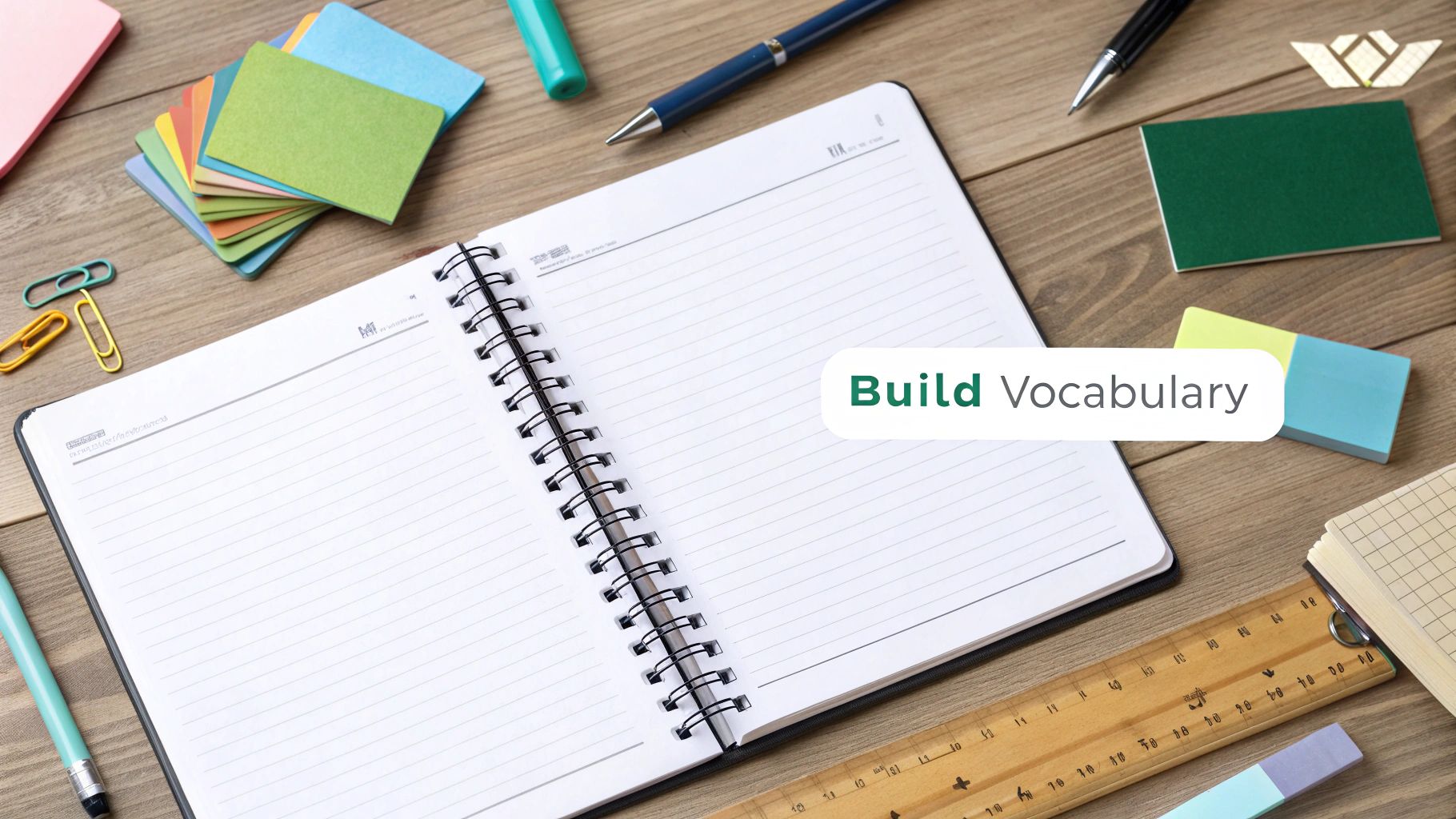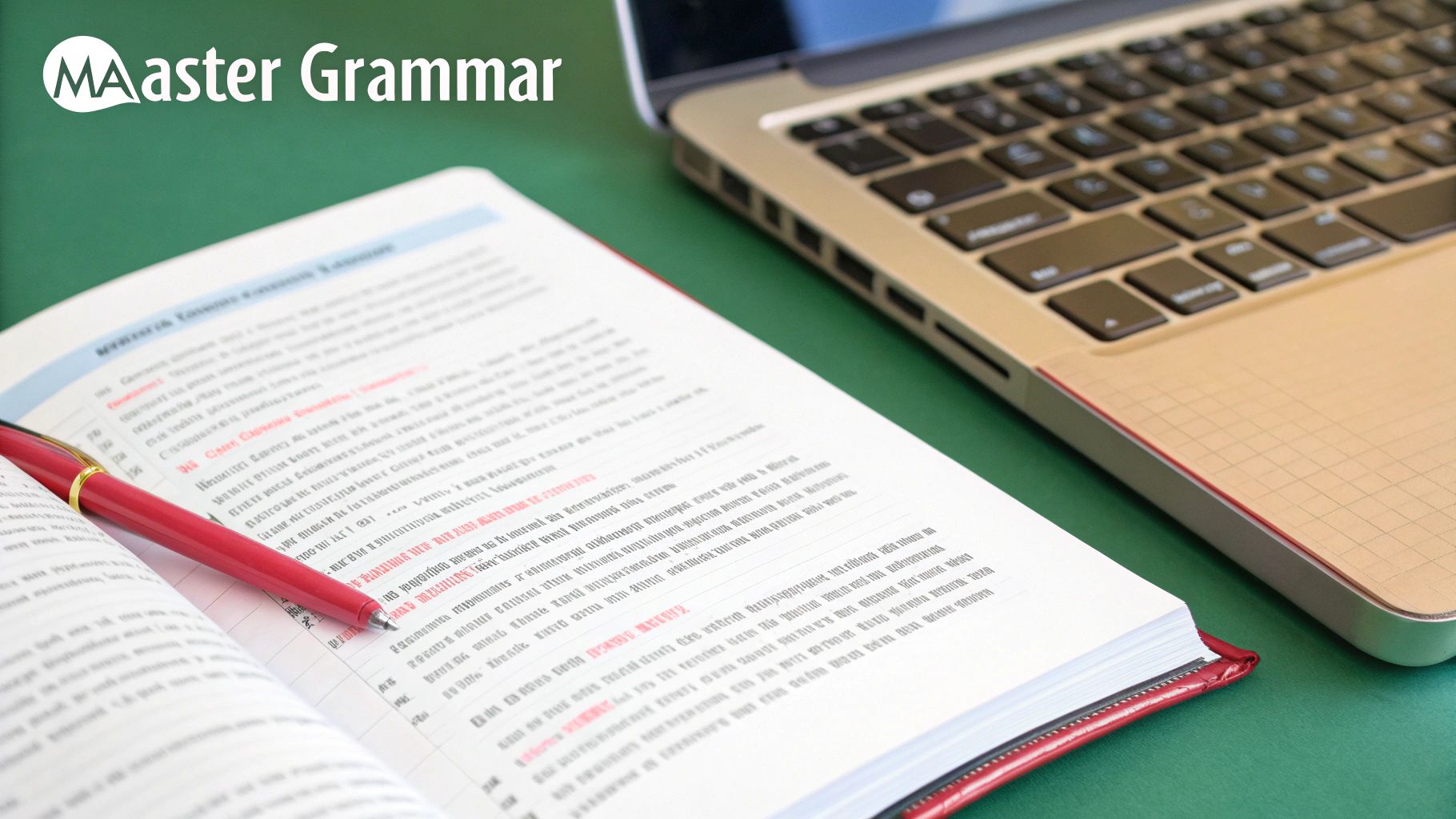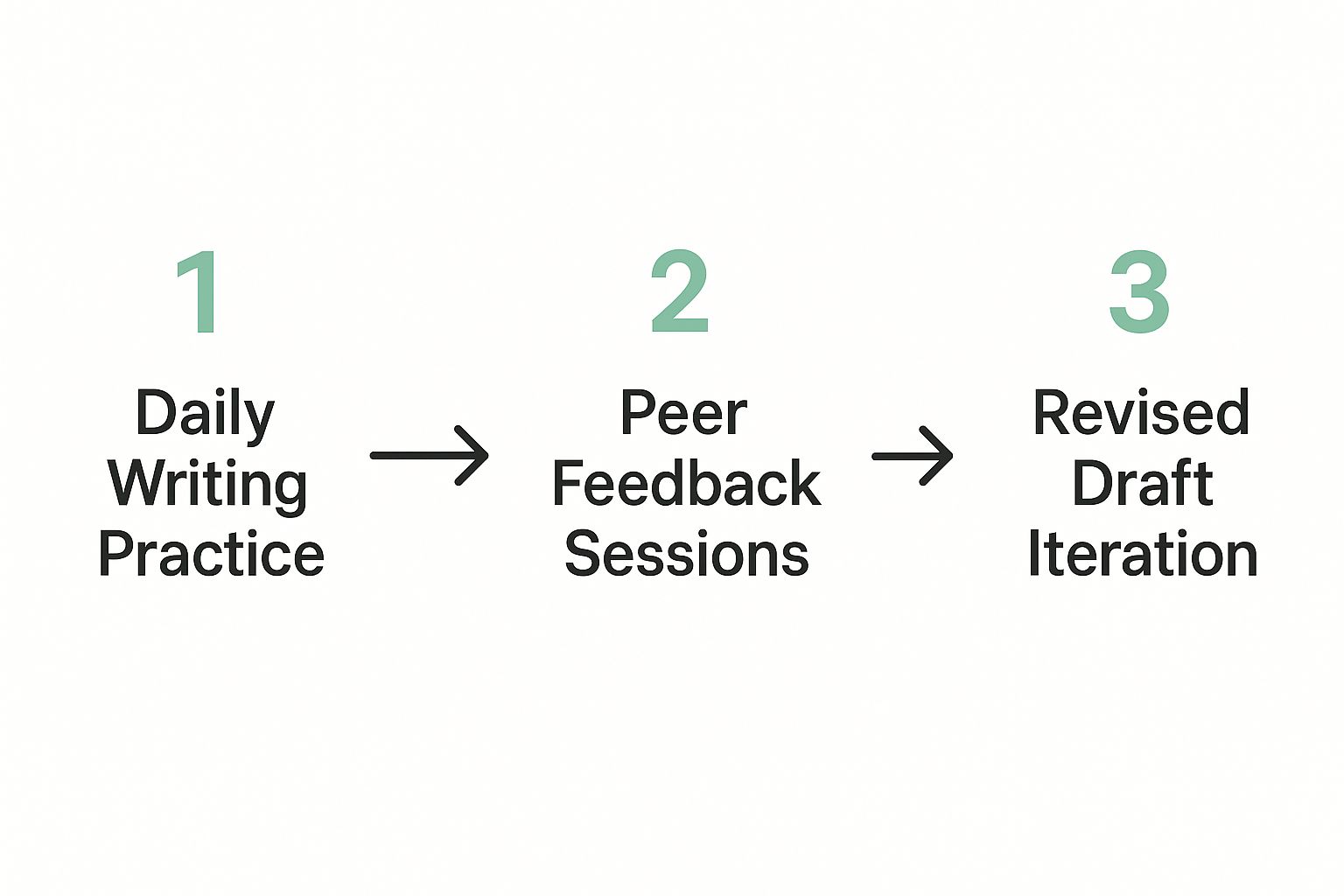
Do you want to improve your English writing skills? The good news is, you don’t need to memorise a dictionary or become a grammar expert overnight. The secret is breaking the process down into small, manageable habits that build your confidence and clarity over time.
This guide will give you actionable strategies to make your writing clear, engaging, and effective, helping you feel more confident whether you're writing an email, a report, or a personal project.
Your Journey to Better English Writing Starts Here

Do you ever feel like your brilliant ideas get lost somewhere between your brain and the page? It’s a common frustration. Many people struggle to find the right words, fix nagging grammar mistakes, or just make their writing clear and effective.
This feeling can hold you back, both personally and professionally. Understanding why it's important to learn English is the first step, but putting that understanding into practice is where the real change happens.
We'll explore the foundations of strong writing—clarity, structure, and practice—and show you how to turn them into achievable daily habits you can start using today. Our goal is to build your confidence from the ground up, helping you master grammar essentials and find your own unique writing voice.
The Challenge of Modern Writing Habits
In a world of instant messaging and emojis, developing strong writing skills is more critical than ever, yet it’s becoming a real challenge. Recent findings show that enjoyment of writing has declined sharply, especially among younger people in the UK.
According to the National Literacy Trust's 2024 Annual Literacy Survey, only 26.6% of children and young people aged 8 to 18 said they enjoy writing in their free time. That’s the lowest level recorded since 2010.
This trend highlights a bigger issue: if we don’t practise writing regularly, improving our skills as adults becomes much harder.
The key isn't to become a perfect writer overnight. It's about building a sustainable practice that makes you a slightly better writer each day. Small, consistent efforts compound into significant skill growth over time.
To give you a clear roadmap, we've broken down the core pillars of effective writing. Think of this table as your guide for the journey ahead—a quick overview of the key areas we’ll be covering.
Core Pillars of Effective English Writing
Here’s a summary of the fundamental areas to focus on for rapid improvement in your writing.
|
Pillar |
Why It Matters |
Quick Tip |
|---|---|---|
|
Grammar & Punctuation |
Forms the foundation of clear communication, ensuring your message is understood correctly. |
Use a free grammar checker as a first-pass editor to catch common mistakes instantly. |
|
Vocabulary & Sentence Flow |
Adds depth and interest to your writing, keeping the reader engaged from start to finish. |
Read diverse materials daily and jot down one new word or phrase you can use. |
|
Consistent Practice |
Builds muscle memory and makes writing a natural, less intimidating activity. |
Write for just 15 minutes every day—it could be an email, a journal entry, or a summary. |
|
Editing & Feedback |
Helps you see your work objectively and spot areas for improvement you might miss. |
Read your writing aloud. If it sounds awkward to say, it will be awkward to read. |
Focusing on these four areas will give you a solid and structured way to become a more skilled and confident writer.
Mastering the Building Blocks of Good Writing

To genuinely improve your English writing, you don't need to swallow a textbook whole. It’s better to think of grammar, punctuation, and spelling as the essential tools that give your words real power and precision. Getting a handle on these building blocks makes sure your message lands exactly as you intended, without any room for confusion.
Let's be honest, the rules can feel a bit intimidating. But when you start breaking them down with practical, real-world examples, they become much more manageable. This isn’t about passing an exam; it's about making your writing clear, credible, and confident.
Why Grammar Still Reigns Supreme
Good grammar is the structure that holds your sentences together. When it’s solid, your writing is easy to follow and your ideas can really shine. If it’s shaky, your reader gets stuck trying to figure out what you’re trying to say, and your credibility can take a knock.
Think of it like building a house. A weak foundation means the whole structure is unstable. The same goes for your writing – clear grammar is the foundation supporting your arguments, stories, and professional messages.
A simple mix-up like "your" and "you're" can completely change the tone of an email. One is possessive ("Is this your report?"), while the other is short for "you are" ("You're doing a great job."). It's a small slip, but it can make your writing seem careless.
The Power of Punctuation
Punctuation marks are the road signs of writing. They tell your reader when to pause, stop, or pay extra attention to a point. Using them correctly guides people smoothly through your thoughts, adding clarity and emphasis exactly where you need it.
A misplaced comma can completely change the meaning of a sentence. Just look at this classic example:
-
"Let's eat, grandma." (This is a friendly invitation for your nan to join you for dinner.)
-
"Let's eat grandma." (This is… something else entirely!)
It really shows how a tiny comma makes a massive difference. Learning how to properly use commas, full stops, and apostrophes is a huge step toward becoming a better writer.
Key Takeaway: Punctuation isn’t just about following dusty old rules. It’s about controlling the rhythm and meaning of your sentences to create the exact impact you want.
Common UK Spelling Stumbling Blocks
Even with spellcheckers watching our every move, certain words are designed to trip us up. UK English has its own unique spellings that can be tricky, but getting them right shows a real attention to detail.
Here are a few common ones you'll see:
-
Practise vs. Practice: In the UK, "practise" is the verb (the action), while "practice" is the noun (the thing). You go to football practice (noun) to practise (verb) your kicks.
-
Licence vs. License: It's the same deal here. "Licence" is the noun (like a driving licence), and "license" is the verb (the council will license a pub).
-
-ise vs. -ize endings: While you might see both, UK English generally prefers "-ise". Think realise, organise, and analyse.
Learning these little distinctions might seem minor, but they add up to create a more polished, professional piece of writing. When you’re consistent, your work instantly feels more authoritative.
From Rules to Tools
For anyone looking to improve their English writing, a shift in mindset is crucial. Stop seeing these fundamentals as restrictive rules you have to follow. Instead, view them as a powerful toolkit that helps you build better, clearer, and more impactful messages.
Each element—grammar, punctuation, and spelling—works together to get the job done.
|
Element |
Its Role in Your Toolkit |
Quick Example |
|---|---|---|
|
Grammar |
Provides the blueprint for clear sentences. |
Using active voice (“The team completed the project”) instead of passive voice (“The project was completed by the team”) makes your writing more direct and punchy. |
|
Punctuation |
Controls the pace and flow of your message. |
A semi-colon connects two closely related ideas; think of it as a “super-comma.” |
|
Spelling |
Ensures professionalism and avoids distraction. |
Remembering “i before e, except after c” can save you from common errors in words like “believe” and “receive.” |
By focusing on these core components one at a time, you build a solid foundation. This allows you to stop worrying so much about making mistakes and start concentrating on what really matters: expressing your ideas effectively.
Expanding Your Vocabulary and Sentence Structure

Once you’re comfortable with the basics of grammar and spelling, it’s time to take the next step. This is where you learn to make your writing not just clear, but genuinely compelling. It’s the difference between writing that is simply understood and writing that is truly felt and remembered by your reader.
It’s all about adding depth, style, and rhythm to your words. This really comes down to two key areas working together: growing your vocabulary and mastering sentence variety. Learning new words gives you a richer palette to paint with, while varied sentence structures create a more dynamic and engaging reading experience. Let's look at a few practical ways to develop both.
How to Grow Your Vocabulary Authentically
A powerful vocabulary isn't about slotting in the longest, most complicated words you can find in a thesaurus. That approach often backfires, leading to writing that feels unnatural and awkward. Instead, the goal is to have the perfect word at your fingertips for any given situation.
By far, the most effective way to build this is through reading. When you read widely—from novels and newspapers to industry reports and blogs—you naturally absorb new words. Crucially, you also see exactly how they are used in context.
A recent government report even highlighted the strong link between reading for pleasure and improved writing ability, text comprehension, and vocabulary breadth. This connection is fundamental; consistent reading doesn't just teach you new words, it improves your overall grasp of the language. You can find more insights in the full government report.
Practical Tip: Keep a "word journal." Whenever you come across a new word you like, jot it down. Note its definition and then try to use it in a sentence of your own. This active engagement helps move the word from your passive vocabulary (words you recognise) to your active vocabulary (words you actually use).
Vary Your Sentence Structure for Better Flow
Have you ever read a paragraph where every single sentence starts the same way and has the same length? It feels monotonous, doesn't it? It can quickly make the reader lose interest. Varying your sentence structure is key to creating a rhythm that keeps your audience hooked.
The goal is simple: mix things up. Combine short, punchy sentences with longer, more descriptive ones. This creates a natural flow that is much more pleasant to read.
-
Short sentences: These are fantastic for making a strong, clear point. They add impact. They create urgency.
-
Longer sentences: These allow you to connect related ideas, add detail, and build a more complex picture for your reader.
Think of it like music. A song with only one note would be incredibly boring. It’s the combination of different notes and rhythms that makes it beautiful. The same principle applies to your writing. You can explore more about the reasons you should study English to see how these techniques are applied in practice.
Transforming Sentences from Flat to Dynamic
Let's look at a real example of how sentence variety works. This is how you can actively improve your English writing skills by focusing on structure.
Before:
The company launched a new product. The product was a success. The company’s profits increased. The customers were happy.
It’s grammatically correct, but it’s flat and uninspired. The repetitive subject-verb-object structure makes it a real slog to read.
After:
Following the successful launch of its new product, the company saw a significant increase in profits. Customer satisfaction soared, cementing the product's place as a market leader.
See the difference? This revised version is far more engaging. It combines short and long clauses, uses stronger verbs ("soared," "cementing"), and connects the ideas logically. It tells a much more compelling story.
Here's a quick comparison:
|
Technique |
Before Example |
After Example |
|---|---|---|
|
Combine Ideas |
Separate, choppy sentences. |
Uses a connecting phrase (“Following the…”). |
|
Use Stronger Verbs |
Relies on “was” and “increased.” |
Uses dynamic verbs like “soared.” |
|
Vary Sentence Start |
All sentences start with “The…” |
Begins with a prepositional phrase. |
By consciously applying these techniques, you start moving beyond just conveying information to crafting a genuinely enjoyable reading experience. This deliberate practice is at the heart of improving your English writing skills.
Developing a Consistent Writing Habit
Knowing the rules of grammar is one thing, but if you really want to see your English writing skills take off, it all boils down to one thing: practice. Just like learning to play the guitar or kicking a football, writing well is about building muscle memory. Let’s get you set up with a realistic plan that actually sticks.
The most effective way to become a better writer isn't some big secret. It’s simply to write more often. The goal is to make writing a small, low-pressure part of your day, not some massive task you spend all week dreading.
Start Small and Stay Consistent
You don't need to write a masterpiece every week to see progress. The real focus should be on frequency over volume. Seriously, committing to just 15-20 minutes of writing each day can make a huge difference over time. It’s a small, manageable goal that helps you build momentum without feeling swamped.
Think about it: a short daily practice is far more powerful than a massive three-hour writing binge once a month. Consistency is what truly trains your brain to translate thoughts into words more smoothly.
A daily writing habit is less about producing a perfect piece of work and more about the simple act of showing up. By making writing a non-negotiable part of your routine, you conquer the fear of the blank page and turn practice into progress.
The image below shows how this simple cycle of practice and feedback creates a powerful loop for getting better.

As you can see, improvement isn't a single event. It's an ongoing process of practice, feedback, and refinement where each step feeds directly into the next, creating a cycle of continuous growth.
Use Everyday Tasks as Practice
Finding time to write doesn't have to mean adding another huge item to your to-do list. The trick is to cleverly weave practice into activities you're already doing. This is a brilliant way to improve your writing without completely disrupting your schedule.
Look for these little opportunities:
-
Emails: Instead of rushing through work emails, take an extra minute or two. Check that they’re clear, concise, and grammatically correct. Focus on using a professional tone and structuring your points logically.
-
Journaling: Spend ten minutes before bed writing about your day. This is a private, no-pressure way to get comfortable expressing your thoughts and feelings in English.
-
Summarising: After reading a news article or watching a short video online, challenge yourself to write a one-paragraph summary of the main points. This really sharpens your ability to spot key information and rephrase it in your own words.
These small exercises might not feel like formal "writing practice," but they absolutely add up. They force you to think about word choice, sentence structure, and clarity in real-world contexts, which is incredibly valuable.
A Sample Weekly Schedule to Get You Started
To make building this habit even easier, here’s a concrete schedule you can use as a starting point. It offers a mix of varied, low-pressure activities to keep your practice interesting and effective. Feel free to adapt it to fit your own interests and lifestyle.
Here’s an example schedule to help you build a consistent writing habit with varied, low-pressure activities.
Sample Weekly Writing Practice Schedule
|
Day |
Activity (15-20 Minutes) |
Focus Skill |
|---|---|---|
|
Monday |
Write a detailed to-do list for the week, using full sentences for each task. |
Clarity and Organisation |
|
Tuesday |
Choose a photo and write a short paragraph describing the scene and atmosphere. |
Descriptive Language |
|
Wednesday |
Read a short online article and write a three-sentence summary of its main argument. |
Comprehension and Conciseness |
|
Thursday |
Write a short, positive review for a product, film, or book you recently enjoyed. |
Persuasive Writing |
|
Friday |
Free write for 15 minutes in a journal. Don’t worry about grammar; just let your thoughts flow. |
Fluency and Idea Generation |
|
Saturday |
Draft a professional email to a colleague or client about a fictional project. |
Formal Tone and Structure |
|
Sunday |
Pick a new word you learned this week and write three different sentences using it correctly. |
Vocabulary Application |
By following a simple structure like this, you remove the guesswork and make it easy to just sit down and write. Consistency is the engine of improvement, and a simple plan like this provides the fuel.
The Power of Editing and Seeking Feedback
You’ve probably heard it before, but it bears repeating: great writers aren't born, they're made. And a huge part of that 'making' happens during the editing process. Getting your ideas down on the page is just the first step. The real magic happens when you go back, chisel away at the rough edges, and refine your message until it’s sharp and impactful.
Think of it this way: your first draft is the raw material. The revision cycle is where you transform that raw material into something polished and professional. It's not about nailing it on the first attempt; it's about being committed to improving your work until it truly shines.
Perfecting Your Own Work Through Self-Editing
Before anyone else lays eyes on your writing, your most important editor is you. Learning to self-edit is a massive leap forward in developing your English writing skills because it trains you to spot your own habits and weaknesses. With a bit of practice, you’ll be surprised at how many mistakes you can catch yourself.
The first trick is to get some distance. Step away from your writing for an hour, or even a whole day if you have the time. When you come back with fresh eyes, you’ll see the text far more objectively, making it easier to notice awkward phrasing, typos, or confusing sentences.
One of the most effective self-editing tricks I know is to read your work aloud. If a sentence feels clunky or you stumble over the words, your reader is guaranteed to find it difficult. Hearing your writing helps you catch unnatural rhythms and overly long sentences that your eyes might just skim over.
To give your self-editing an extra boost, you might want to explore advanced writing and editing tools like ProWritingAid and Grammarly. Think of them as a helpful assistant that can flag potential issues for you to review before you ask for human feedback.
The Value of a Second Opinion
No matter how good you get at spotting your own errors, you can never fully see your work from a completely fresh perspective. It’s human nature to read what we meant to write, not what's actually on the page. That's precisely why getting a second pair of eyes on your work is so incredibly valuable.
A friend, a fellow student, or a tutor can offer insights you’d never have considered. They can highlight:
-
Areas of confusion: Where your argument isn’t as clear as you thought.
-
Unintended tone: Whether your writing comes across as too formal, too casual, or even unintentionally blunt.
-
Persistent errors: Habitual grammar or spelling mistakes that you’ve become blind to.
How to Ask For and Use Constructive Feedback
Getting useful feedback is an art in itself, and it starts with asking the right questions. Simply handing over your work and saying, "What do you think?" can be overwhelming for your reviewer and might not get you the specific help you need.
Instead, try asking targeted questions to guide them:
-
"Is my main point in the first paragraph clear?"
-
"Does the argument in this section feel repetitive to you?"
-
"Could you tell me if the tone feels appropriate here?"
When you receive feedback, the key is to listen with an open mind. Remember, the goal is to improve your writing, so even critical comments are a gift. Thank the person for their time and genuinely consider their suggestions. You don’t have to accept every single change, but each piece of feedback is a chance to see your work from a new angle.
And if you find yourself staring at a blank page during the revision process, don't panic—our guide to fighting writer's block has some great strategies to get you back on track.
Improve Your English Writing Skills with Stonebridge College's Functional Skills English & Maths Level 2 Course
Self-study and daily practice are great for boosting confidence, but at times, a more structured approach is needed to advance further. If you're looking to enhance your English writing skills and obtain a qualification that reflects your abilities, Stonebridge College offers an effective online pathway to achieve this.
The Functional Skills English and Maths Level 2 course is structured to guide you through the topic in a logical manner, ensuring a steady build-up of your knowledge. This prevents you from missing essential skills and helps you progress efficiently. With expert guidance, you'll receive personalised feedback that allows you to identify and address your weaknesses more effectively than on your own. All the while boosting your maths skills too!
Flexible Learning for Busy Lives
For many adults, finding time to study can be a challenge due to work, family, and other commitments. Traditional classroom courses may seem unattainable, but Stonebridge College's online education offers a flexible solution that fits your schedule.
Our Functional Skills English & Maths Level 2 course is entirely online, allowing you to learn at your convenience. You can study at your own pace, whether it's during a lunch break or over the weekend. Our focus is on providing education that supports your career goals, helping you improve your English writing in a way that suits your life.
A Learning Model Built for You
We know that committing to a long, expensive course can be a big decision. That’s why Stonebridge has developed a unique, flexible subscription-based model. Instead of locking you into a long-term credit agreement, you simply pay an affordable monthly fee for access to all your course materials and one-to-one support from qualified tutors.
This puts you firmly in control of your own learning journey.
-
No Long-Term Contracts: Life is unpredictable, and your education should be able to adapt. You have the freedom to pause or cancel your subscription at any time, no questions asked.
-
Personalised Tutor Support: You’re never on your own. Our expert tutors are there to answer your questions, give you constructive feedback, and guide you towards success.
-
Affordable and Transparent: With a clear monthly fee, you can easily budget for your education without worrying about hidden costs or huge upfront payments.
Choosing to get a formal qualification is an investment in yourself. A flexible subscription model removes the financial stress and logistical headaches, making it easier than ever for adult learners to achieve recognised credentials and get ahead in their careers.
For anyone looking to solidify their core English skills, the Functional Skills English and Maths Level 2 qualification is the perfect choice. This course is designed to arm you with the practical writing abilities needed for work, further education, and everyday life. It validates your ability to communicate clearly and professionally—a skill that employers in every industry value highly. With over twenty years of experience, Stonebridge has helped thousands of learners reach their goals entirely online, giving them the tools and support they need to succeed.
Ready to turn your writing skills into a recognised qualification? Stonebridge Associated Colleges offers a flexible and supportive way to learn. Check out our Functional Skills English and Maths Level 2 course and see how our subscription model can fit your life and ambitions.




